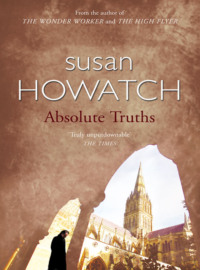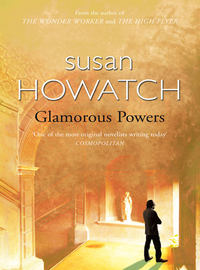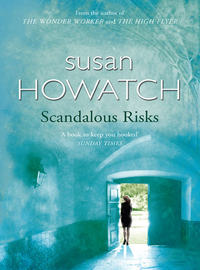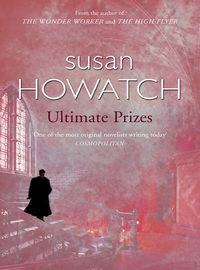
Полная версия
Glittering Images
The knowledge of how much I owed the Archbishop was never far from the surface of my mind. I said politely, ‘I’m afraid I disapprove of divorce being made easier, Lady Starmouth.’
‘My dear Dr Ashworth, you surprise me! I thought you’d have very liberal modern views!’
‘Not if he’s the Archbishop’s man,’ said our host, breaking off his conversation with Mrs Jennings.
‘I’m no one’s man but my own, Dr Jardine!’ I said at once. I felt unnerved as well as annoyed that he had seen straight through my dutifully conservative stance.
‘Well spoken!’ said Lady Starmouth.
‘Do you approve of divorce at all, Canon?’ said Lord Starmouth with interest.
This placed me in a fresh dilemma. If I wanted to be entirely loyal to Lang, who followed the teaching on divorce in St Mark’s Gospel, I would have to say that I believed marriage to be indissoluble, but I was now anxious to show Jardine that I was no mere sycophantic echo of the Archbishop. On the other hand some loyalty to Lang was essential; I could hardly espouse Jardine’s extreme and controversial views. I decided to seek the diplomatic middle course by jettisoning St Mark in favour of St Matthew.
‘I believe,’ I said, ‘that adultery should be a ground for divorce – for both sexes, just as Our Lord said.’
‘So you disapprove of the rest of A. P. Herbert’s Bill?’ said Jennings, coming late to the conversation and manifesting the teacher’s desire to clarify a clouded issue. ‘You don’t believe that the grounds for divorce should be extended to include cruelty, insanity and desertion?’
‘Precisely.’
‘So!’ said Jardine, unable to remain silent a moment longer, his amber eyes lambent at the prospect of debate. ‘You would approve a divorce, would you, Dr Ashworth, if a man spends ten minutes in a hotel bedroom with a woman he’s never met before – yet you would deny a divorce to a woman whose husband has subjected her for years to the most disgusting cruelties?’
‘I’m not denying the remedy of a legal separation in such a case.’
‘In other words you’d condemn her to a miserable limbo, unable to remarry! And all because you and the other clerics who tow the High Church line insist on clinging to an utterly fallacious interpretation of Our Lord’s teaching in the Synoptic Gospels!’
‘I –’
‘You don’t seriously think Our Lord was talking about divorce as a lawyer, do you?’
‘I think Our Lord was talking about what he believed to be right!’ I was aware that all other conversation in the room had ceased; even the servants by the sideboard were transfixed.
Jardine said truculently, ‘But he wasn’t talking legalistically – he wasn’t, in advance of Christian history, claiming to be another Moses, the supreme law-giver. He was a life-giving spirit, not a legal code personified!’
‘He was indeed a life-giving spirit,’ I said, ‘and he illustrated the true life of Man – he made clear the principles of right human action, and I think we ignore his teaching at our peril, Bishop!’
‘But what exactly was his teaching on divorce?’ demanded Jardine, ripping open the hole in my argument. ‘The Gospels don’t agree! I think the clause permitting divorce for adultery was inserted into St Matthew’s Gospel in an attempt to correct the legalistic way in which the early Church had thoroughly misunderstood the teaching of Jesus –’
‘That’s Brunner’s theory, of course, but Brunner’s notorious for remodelling Christianity to suit the twentieth century –’
‘Brunner’s reinterpreting Christianity in the light of the twentieth century, and what’s wrong with that? Every generation has to interpret Christianity afresh –’
‘Bishop, are you saying that A. P. Herbert has a license to rewrite St Matthew?’
‘– and one of the outstanding aspects of Christianity is that Christ preached compassion and forgiveness, not an inflexible hardness of heart. How long were you married, Dr Ashworth?’
‘Three years. But –’
‘And during those three years,’ pursued Jardine, ‘did you have no glimpse of what the state of matrimony could be like for others less fortunate than yourself?’
‘That’s absolutely irrelevant to the theological point under discussion!’
‘You were happily married, I assume?’
‘Yes, I was – and that’s exactly why I’m opposed to debasing the institution of marriage by a set of fashionable divorce laws which go far beyond the teaching of Christ!’
‘It’s people who debase marriage, not laws – people who would keep a couple yoked together in circumstances which would have made Christ weep! Tell me, how long have you been a widower? It must be hard for you to remain single when you regard marriage as such a blissfully ideal state!’
I hesitated. I was by this time very profoundly disturbed. I sensed I was losing control not only of the debate but of my inner equilibrium, the equilibrium which I had to maintain in order to be the man I wanted to be, and although I knew I had to terminate the conversation I could not see how to do it without a disastrous loss of face.
‘Well?’ demanded Jardine. ‘Why the long silence? Let me ask you again: how long have you been a widower?’
I saw the trap he was setting to expose my hypocrisy but I saw too that there was no escaping it. Pride and prudence combined to make an outright lie impossible. In defiance I said finally, ‘Seven years.’
‘Seven years!’ The amber eyes widened as I gave him the answer he wanted. I felt as if my soul had been X-rayed. Nausea churned in the pit of my stomach. ‘You surprise me, Dr Ashworth! You talk so sanctimoniously about the institution of marriage yet apparently you have little desire to marry again! Is this because of a belated call to celibacy? Or are you perhaps not quite such a stranger to marital unhappiness as you would have us all believe?’
He had tied me up in such a knot that I had no choice but to grab the sharpest knife to slash myself free. ‘I’m certainly no stranger to marital tragedy,’ I said. ‘My wife was killed in a car crash when she was expecting our first child, and I often think I’ll never recover from the loss.’
There was a silence. The light went out of Jardine’s lambent eyes, and for a second I saw the grief mark his face as a memory seared his mind. Around the table no one moved. The room seemed suffocating.
At last Jardine said, ‘I’m most extremely sorry, Dr Ashworth. I’ve no personal experience of losing a wife but I do know what it’s like to lose a child. Forgive me for trespassing so intolerably on what must be a very deep and private grief.’
I was so conscious of shame that I was unable to speak. Jardine might not have exposed me as a fraud to his guests but he had exposed me as a fraud to myself, and I knew that to preserve my fraudulent mask I had taken the cheapest way out when I had had my back to the wall.
I was still groping for composure seconds later when the ladies withdrew and Colonel Cobden-Smith immediately announced his intention of retiring to the smoking-room. Lord Starmouth offered to accompany him, and after helping themselves to a glass of port apiece they departed in search of tranquillity after the débâcle at the dinner table.
‘I’ve such a strong aversion to smoking,’ Jardine explained to Jennings as the door closed behind the last servant, ‘that I insist on confining it to one room of the house.’ He turned to me with careful courtesy. ‘But perhaps you’d care to join the Colonel and Lord Starmouth, Canon – are you a smoker?’
‘Yes, but not when I’m wearing my clerical collar.’ My voice sounded astonishingly casual.
‘How admirable. And you, Jennings?’
‘I’m a non-smoker, my Lord.’
‘Even more admirable. Jennings, you may address me as “Bishop” or as “Dr Jardine” but leave “My Lord” to the servants, if you please. I think bishops suffer quite enough from delusions of grandeur without being addressed as if they’d been born to the purple … Well, gentlemen, you’ve just seen me at my worst and now I must make every attempt to display myself at my best. Dr Ashworth –’ he passed me the decanter ‘– I beg you to help yourself to the largest possible glass of port and to tell me about your new book. His Grace muttered something about fourth-century Christology and St Anselm, but as there appears to be no connection between the two subjects I confess I’m mystified – or are you perhaps hoping to prove that the seeds of the ontological argument were sown at the Council of Nicaea?’ And he gave me his most charming smile.
I smiled back to signal that I had every intention of supporting his attempt to restore a convivial atmosphere, and began to explain my plan to revise my lectures, but it was Jennings, not Jardine, who talked to me about St Anselm. The chaplain interposed a remark about the Cathedral library but sank into silence as the discussion of St Anselm’s theology degenerated into the dreariest type of academic debate.
Suddenly I said to Jardine, ‘I’m sorry, we must be boring you.’
‘Not in the least.’ He sipped his port. ‘I was merely wondering why you turn your back on the present to bury yourself in the remote past. But perhaps modern Church history would involve you in modern Church politics which is a subject best avoided if your views are unlikely to please the people in power.’
I recognized that this subtly dangerous statement was not an attack but an inquiry; he was giving me the opportunity to state that my career had not been distorted by the most unwholesome form of ambition, and I said at once, ‘I happen to find Arianism and Modalism more stimulating than the Oxford Movement.’
Jardine picked up the reference to Anglo-Catholicism. ‘Does that indicate a certain ambivalence about the High Church party?’
He was inviting me to disassociate myself from Lang, and suddenly I knew he would once again see straight through any profession of loyalty which was not entirely sincere. ‘I was sympathetic to Anglo-Catholicism when I was ordained,’ I said in a clumsy attempt at evasion.
‘So was I – that’ll surprise you, won’t it! But I can see now that I was merely trying to reject my Nonconformist background.’ He turned suddenly to his chaplain. ‘Gerald, I’ve promised to lend Mr Jennings that book by Brunner, The Mediator. Take him to the library, would you, and look it out for him.’
That disposed of Jennings and Harvey. I was alone with the Bishop at last and almost before the door had closed I found myself saying: ‘I’m beginning to think you see straight through everything.’
‘I have a first-class try. I sometimes think I know what life must be like for a musician who possesses perfect pitch. I have a well-nigh infallible ear for detecting false notes in a conversation.’
‘During our debate –’
‘During our debate you tried to conceal that your private views on divorce are rather different from your public views. Yes. I know. And that’s why I couldn’t resist the temptation to tear you to shreds, but I am indeed most sincerely sorry that the debate went so wrong.’
‘It’s all right. My hypocrisy got what it deserved. Sorry I took such a cheap way out.’ The conversation was now so far removed from any dialogue I could have foreseen that I was unable to sustain it. Moving to the hearth, the glass of port in my hand, I pretended to examine the carvings on the chimneypiece.
‘Now that,’ said Jardine, ‘is a very remarkable apology. You’re beginning to interest me exceedingly, Dr Ashworth.’ Although I had my back to him, I heard the splash as he refilled his glass. ‘First of all I was tempted to write you off as just another of Lang’s bright young men,’ he was saying, ‘but the truth’s more complicated than that, isn’t it? You no longer find the required mask of sycophancy easy to wear.’
I finished my port before saying, ‘I’m very much in Dr Lang’s debt.’
‘Of course you are. Men of power have a knack of building up extensive credit, but if one is in a position of power,’ said Jardine, moving over to me with the decanter in his hand, ‘one must always be scrupulously careful not to bankrupt one’s debtors by demanding inappropriate methods of repayment. More port?’
‘Thank you.’ I held out my glass with a steady hand.
‘May I give you a word of advice? Your first duty, debts or no debts, is not to the Archbishop of Canterbury. Your first duty is to God who created you as a unique individual in his own image, not as a miraculous facsimile of Dr Lang. Be yourself, Dr Ashworth. Be the man God intended you to be, not the sycophant His Grace’s vanity would prefer. And now,’ said Jardine, having refilled my glass, ‘I shall stop preaching and we shall divert ourselves very briefly, before we join the ladies, by ruminating on an issue which to me is of far greater interest than dear old St Anselm’s meditations. I refer to the search for the historical Jesus – do you think we can ever see beyond the shining image of the Gospels to the man he really was?’
‘I think it can be unproductive to probe behind glittering images,’ I said, ‘and with all due respect I believe your generation has been too preoccupied with Christ’s humanity at the expense of his divinity.’
Jardine smiled. ‘You think that in pursuing the concept of the immanence of God in mankind we’ve wound up losing sight of God and following mankind, as represented by Christ, down a historical blind alley?’
‘Exactly. Speaking for myself, I’m much more interested in the modern doctrines asserting God’s transcendence and the importance of revelation – I think we should focus on the message Christ presented, not on the shadowy figure behind the glittering image,’ I said firmly, and escaping with profound relief into the world of scholarship, I began to talk of the writings of Karl Barth and the challenge of Crisis Theology.
VI
On our return to the drawing-room Jardine announced: ‘I’m glad to say that Dr Ashworth and I have quite resolved our differences so there’s no need for anyone to remain embarrassed by our debate … Lady Starmouth, come outside and take a turn with me on the terrace.’
‘Coffee, Dr Ashworth?’ called Miss Christie.
‘Yes – thank you.’ I was just moving towards her with alacrity when I was intercepted by a distraught Mrs Jardine.
‘Dr Ashworth, I’m so very sorry – my husband was terribly upset afterwards, I know he was – it was when you mentioned the baby –’ As she broke off I saw to my horror that her eyes were full of tears.
‘My dear Mrs Jardine – please – don’t distress yourself –’
But Miss Christie had come to the rescue. ‘It’s all right, darling,’ she said to Mrs Jardine, and I was struck by her use of an endearment. ‘Dr Ashworth understands. Come and sit down – Mrs Jennings and I were just discussing the choirboys’ concert.’ And passing me my cup of coffee she steered Mrs Jardine to the cluster of chairs where Mrs Jennings was waiting. I found myself abandoned to the company of the Cobden-Smiths, but Lord Starmouth was no more than six paces away by the fireplace and as our glances met he said without emphasis: ‘The Bishop’s passions get the better of him sometimes, but he’s a good man.’
‘One doesn’t look for passion in a bishop,’ said the Colonel with unexpected tartness. ‘Bad form.’
‘Very bad form,’ agreed his wife, ‘but then of course if one’s not brought up to know the difference between good form and bad form one’s bound to cause chaos in later life.’
‘Steady on, Amy!’
‘But my dear, Alex is the first to admit his upbringing left a lot to be desired! That peculiar old father and that dreadful little villa in Putney –’
‘The great thing about the Bishop,’ said Lord Starmouth, ‘is that he’ll own to the little villa in Putney. A lesser man would simply draw a veil over it.’
‘He had the veil firmly in place when he met Carrie,’ said Mrs Cobden-Smith.
‘Steady on, Amy!’ The Colonel was now clearly nervous. He shot a wary glance in my direction, but I was more interested in Miss Christie; she had left Mrs Jardine, now happily talking about choirboys to Mrs Jennings, and was approaching us with the coffee-pot.
‘Is Carrie all right?’ murmured the Colonel as his cup was refilled.
‘Yes, all’s well, Colonel, don’t worry.’
‘Dr Ashworth still looks a little white around the gills,’ said Mrs Cobden-Smith.
‘That hardly says much for the power of the Bishop’s port,’ said Miss Christie drily, sweeping away again with the coffee-pot.
‘That’s a very strange girl,’ mused Mrs Cobden-Smith, ‘but so good with Carrie.’
I said casually, ‘She must be a great asset in the household.’
‘That hardly does her justice. When I think of that time at Radbury before her arrival –’
‘My dear,’ said the Colonel with surprising firmness, ‘I don’t think we’ll talk about that at present, if you please.’
I was disappointed, and with reluctance I realized that it might pay me later to cultivate Mrs Cobden-Smith.
I had apparently resumed my role of spy. Did this mean I was regaining my equilibrium after the bizarre scene with Jardine? I supposed it did, yet I had no wish to think of spying and no desire whatsoever to dwell on bizarre scenes. Easing myself away from the Cobden-Smiths I succeeded in cornering Miss Christie at the side-table where she was stacking the coffee-cups on to a tray.
‘What time is Communion tomorrow?’ I said, offering the most inoffensive question I could devise.
‘Eight o’clock. Breakfast is at nine.’ She looked past me at the drawing-room door. ‘Here come Mr Jennings and Gerald – will you excuse me? I must order fresh coffee for them.’
I lost her, and it occurred to me then that a quiet mild approach was going to make no impression whatsoever on Miss Christie. However if she thought she could brush me aside merely by juggling coffee-cups she had made a big mistake.
I resolved to adopt a much tougher line in future.
VII
It was after eleven when I regained the sanctuary of my room, and having stripped off my clothes I smoked a cigarette as I tried to work out what had happened. Some strange bond seemed to have been forged between me and my host but it seemed to be my duty to ignore it. It was not my business either to like or to loathe Jardine; my task was merely to estimate how vulnerable he was to scandal.
However I found I now had a stronger desire than before not to connive with Lang in any secret plan to oust Jardine from the Bench of Bishops. Jardine was clearly innocent. A man of such integrity would be incapable of living a secret life as an apostate steeped in adultery, and I was also sure he was far too shrewd to engage in any middle-aged folly which fell short of an adulterous liaison. It seemed obvious that he exercised his flirtatious streak harmlessly with his lovely ladies and had long treated Miss Christie as part of the palace furniture.
This conclusion was reassuring enough, but I still had to answer the question of what went on in Miss Christie’s mind while Jardine behaved like the good man he undoubtedly was. I reminded myself that Jardine could still be vulnerable to scandal if Miss Christie decided to play the neurotic spinster by transforming herself into a furnace of frustrated passion, and although she hardly gave the impression of being a neurotic spinster I felt there was something odd about her extreme self-containment.
I decided I had a moral duty to investigate Miss Christie further and an absolute moral duty to discover how likely she was to transform herself into a furnace of passion.
No Jesuit could have achieved a more satisfying casuistry. With a smile I stubbed out my cigarette, retired to bed and began to plot my espionage for the morrow.
THREE
‘I have seen so many clerical careers arrested, and (to all outward seeming) definitely marred, by the clergyman’s marriage, that I never hear of a clergyman’s becoming “engaged” without a shiver of anxiety.’
Letters of Herbert Hensley Henson Bishop of Durham 1920–1939 ed. E. F. BRALEY.
I
I awoke violently at seven. Naturally I had been dreaming of Miss Christie. I wanted to smoke a cigarette, but I decided that I had no excuse for breaking any of the minor rules by which I achieved self-discipline, and one of those rules was that I never smoked before breakfast. With an effort I read the morning office. Then making another random dip into the Bible I eventually encountered the appropriate words: ‘Seek and ye shall find’.
As I dressed it occurred to me that I still had to seek and find a great many facts about Jardine before I could report convincingly to Lang that the Bishop’s private life was as pure as driven snow; my impression of innocence would carry little weight unless it were supported by a thorough understanding of Jardine’s psychology, and I could hardly establish a psychological portrait without much more information about his past. Apart from gauging Miss Christie’s ability to become a furnace of passion my main task was clearly to talk to as many people as possible about the Bishop without making them suspect they were being interrogated, but I doubted that this would prove difficult. People always enjoy a gossip about a famous man, and when a famous man is personally known to them the temptation to reveal how much they know is all the greater.
Leaving my room, I padded downstairs. I met no one, although I could hear the distant rattling and banging of servants pursuing their early morning rituals. Opening the front door I stepped out into the porch, and the brilliant sunlight flooded into my eyes so that for a second I saw only a shimmering green pattern of beech leaves and grass. Beyond the drive the pale stone of the Cathedral soared into a cloudless sky, and after opening the white gate which was set in the wall of the churchyard I headed along the north side of the building to the porch.
A passing verger directed me to St Anselm’s Chapel where the weekday Communion services were held. There was no time to gape at the glory of the nave; I wanted to clear my mind in preparation for worship, and as soon as I had chosen my seat in the chapel I knelt to sharpen my concentration. However I had instantly noted Miss Christie’s absence.
This failed to surprise me. Weekday Communion is seldom attended by hordes of laymen, and in fact I saw no one I knew from the palace in the small congregation. Then Gerald Harvey hurried into the row behind me, and seconds later at eight o’clock the Dean and the Bishop appeared, preceded by the verger.
As the service progressed I thought how preposterous it was to imagine a bishop administering the sacrament when he was not in a state of grace, and again I remembered the integrity which had emanated from Jardine during our private conversation over the port.
My moment came to receive the sacrament. Erasing all thought of my commission I focused my mind on the spiritual reality confronting me and it was not until I had returned to my seat that I allowed myself to think again of Jardine. I vowed to remember that my first duty was not to the Archbishop of Canterbury. I asked for the strength to overcome my weaknesses. And at the conclusion of the service I let the familiar prayer of Christ echo in my mind: Let thy will, not mine, be done.
Lang’s will immediately became as unimportant as my own. I felt comforted, and rising to my feet at last I left the chapel to find Gerald Harvey hovering in the side-aisle.
‘Waiting for the Bishop?’ I enquired with a smile.
‘No, for you.’
I was impressed by this courtesy and at once I felt guilty that I had written him off as ineffectual. ‘How nice of you,’ I said. ‘Sorry I’ve kept you hanging about.’
‘Oh, you mustn’t apologize for taking extra time for prayer!’ said Harvey shocked. He was so young and ingenuous that he made me feel old and world-weary. ‘How did you like the service?’






